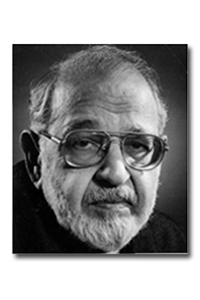Sachidanand Hiranand Vatsyayan (b.1911-d.1987), one of the most influential Hindi authors of the twentieth century is regarded as the pioneer of Nayi Kavita (new poetry) and Prayogavaad (experimentalism) movements in modern Hindi literature. He published most of his works under the pen name ‘Agyeya’ (‘not to be known’ or ‘unknowable’).
Agyeya was born on 7 March 1911 in a Punjabi Brahman family at an archaeological camp near Kasia, in Kushinagar district (Uttar Pradesh, India), where his father, Hiranand Sastri, a renowned archaeologist, was stationed for an excavation. Due to his father’s professional commitments, the family had to move around to different places like Srinagar (1915-1919), Patna (1920), Nalanda (1921), and the Nilgiri mountains (1921-1925), which exposed Agyeya to different Indian languages and cultures. This gave him a deep appreciation of the richness of Indian tradition. In 1925, Agyeya matriculated from the University of Punjab. He then went to Madras to study sciences at the Madras Christian College and passed intermediate exam in 1927. In the same year, he joined the Forman Christian College in Lahore and graduated in science (1929), standing first in class. Agyeya enrolled for an MA in English in 1929, but dropped out. Around this time he came into contact with the revolutionaries and joined the Hindustan Socialist Republican Army (HSRA). In 1930, Agyeya was arrested and sentenced to four years on charges of sedition for helping Bhagat Singh to escape from jail.
During the four years in prison, Agyeya wrote short stories and poems which were published in Hans, edited by Munshi Premchand. His first collection of poems, Bhagnadoot, appeared in 1933. After his release from the jail, he published his short story collection, Vipathga, in 1937. In prison he also wrote the first draft of his novel trilogy Shekhar: Ek Jiwani, the third part of which remains unpublished to this day. The first volume of the novel was published in 1941 and the second in 1944. In 1943, Agyeya edited and published Tar Saptak, a collection of poems by seven young writers, whose poems were never published before. This anthology of modern Hindi poetry was considered a milestone in Hindi literature. It gave rise to Prayogvaad (experimentalism) and Nayi Kavita (new poetry) in Hindi poetry.
Agyeya was associated with the Progressive Writers Association (PWA) and in 1942, he organised the All India Anti-Fascist Convention. He also worked at the All India Radio for a while. During World War II, in line with his anti-fascist stance, Agyeya joined the Indian army and was sent to the Kohima Front as a combatant officer. He left the army in 1946 and stayed at Meerut (Uttar Pradesh) for some time. He remained active in local literary groups and translated as well as published works of other authors into English, and a collection of his own poems, Prison Days and Other Poems.
In 1961, Agyeya joined the University of California, Berkley as a visiting lecturer in Indian Literature and Civilization, and remained there until June 1964. Agyeya returned in 1965 and became the founder-editor of the newsweekly Dinaman of the Times of India group. In 1968, he embarked on another trip to Europe and returned to Berkley as Regents Professor (1969-70). Later, he joined the University of Jodhpur, Rajasthan as Professor and Head of the Department of Comparative Literature. He was also the editor of Jayaprakash Narayan’s Everyman’s Weekly (1973-74) and editor-in- chief of Hindi daily Navbharat Times (1977-80).
Agyeya was awarded the Sahitya Akademi Award (1964) for his collection of poems Angan Ke Par Dwar, Jnanpith Award (1978) for his book Kitni Naavon Mein Kitni Baar, Bharatbharati Award and Golden Wreath Award for poetry in 1983.
Agyeya was a polyglot and mastered many languages such as Hindi, Persian, Bangla, Tamil, Sanskrit, French and German. Agyeya translated some of his own works, as well as works of some other Indian authors to English. He also translated some books of world literature into Hindi.
An immensely versatile and prolific short-story writer, poet, essayist, critic, journalist, translator, and travelogue-writer his publications include:
Poetry collections: Bhagnadoot (1933), Chinta (1942), Tar Saptak (1943), Ityalam (1946), Hari Ghaas Par Kshan Bhar (1949), Bawra Aheri (1954), Ari O Karuna Prabhamaya (1959), Angan Ke Par Dwar (1961), Purva (1965), Kitni Naavon Mein Kitni Baar (1967), Kyonki Main Usse Jaanta Hoon (1969), Sagar Mudra (1970), Pahle Main Sannata Bunta Hoon (1973), Mahavriksha Ke Neeche (1977), Nadi Ki Baank Par Chhaya (1982), Sadanira I & II (1986), Aisa Koi Ghar Aapne Dekha Hai (1986), Maruthal (1995).
Novels: Shekhar: Ek Jiwani I (1941), II (1944), III (Unpublished), Nadi Ke Dvip (1952), Apne-apne Ajnabi (1961).
Stories: Vipathga (1937), Parmpara (1944), Kothri Ki Baat (1945), Sarnarthi (1948), Jai Dol (1951), Amar Vallari Tatha Anya Kahaniyan (1954), Kadiyan Tatha Anya Kahaniyan (1957), Acchute Phool Tatha Anya Kahaniyan (1960), Ye Tere Pratiroop (1961), Jigyasa Tatha Anya Kahaniyan (1965), Chhorra Hua Rasta (Sampoorn Kahaniyan-1, 1975), Lautti Pagdandiyan (Sampoorn Kahaniyan-2, 1975), Sampurn Kahaniyan (2005).
Travelogues: Are Yayavar Rahega Yaad (1953), Ek Boond Sahsa Uchhli (1960), Kiranon Ki Khoj Main (1955).
Criticism: Trishanku, Hindi Sahitya: Ek Adhunik Paridrishya, Atmanepad, Aatmparak, Alwal, Likhi Kagad Kore, Jog Likhi, Adyatan, Samvatsar, Smriti Ke Paridrishya, Strot Aur Setu, Vyakti Aur Vyavastha, Yug-sandhion Par, Dhara Aur Kinare, Bharatiya Kala Drishti, Smritichhanda, Kendra Aur Paridhi, Srijan: Kyon Aur Kaise, Kavi Nikash.
Translations: Rabindranath Tagore’s Gora into Hindi, Dharamveer Bharti’s Suraj Ka Satavan Ghoda into English, Jainendra Kumar’s Tyagpatra into English, Romain Rolland’s Vivekananda into Hindi.
About the collection: The collection contains correspondence with family and friends, contemporary writers and poets, journalists, publishers and political figures. There are diaries, notebooks, drafts, manuscripts, press clippings, pamphlets/booklets, photographs and drawings. One of the free thinkers of the Hindi literary world, his papers are most significant for the study and research of trends in modern Hindi literature in the twentieth century.
Donor: Vatsal Nidhi
Acquisition: 2023



